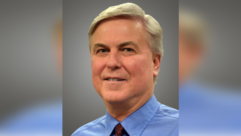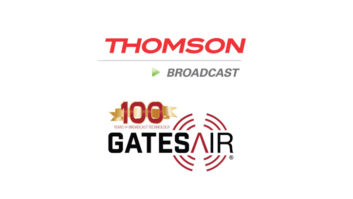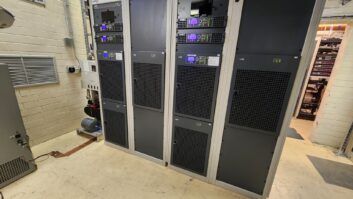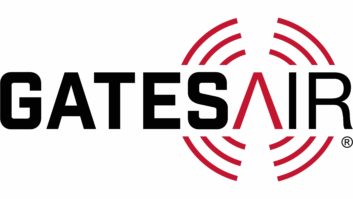
Tim Anderson With Baby
Tim Anderson, CPBE/DRB, CBNE, who many in the industry know as the manager of Radio Product and Business Development at equipment manufacturer GatesAir, has left the company to pursue his dream to be a professional airline pilot.
Radio World managed to keep him on the ground a little longer to answer some questions.
Radio World: Are you really, literally, flying the coop?
Tim Anderson: I recently accepted a First Officer position with United Airlines’ regional carrier CommutAir and have started training in Dallas. If all goes well, I hope to be “flying the line” out of Newark, N.J., by February (burrrr!). However, my wife, Mary Anne, and I will remain in at our home base in Northern Kentucky.
RW: What prompted this?
Anderson: My two passions are radio and aviation, but I’m just flipping the priorities for awhile. It’s exciting, terrifying and I see it as a once-in-a-lifetime opportunity.
RW: How long were you with Harris/GatesAir? What will you miss?
Anderson: I’ve been with GatesAir (and Harris) for about 9 1/2 years. I started in August 2007 as the manager of Radio Product and Market Development, leading the conceptual product development efforts for the Flexiva, HPX and FAX Family of FM transmitters and HD Radio systems.
What I’ll miss most about working at GatesAir are the great people. They are some of the smartest, most passionate professionals I’ve ever worked with. I’ll miss my customers too, some of whom I’ve grown up with and known for nearly 40 years. Oh, and I’ll really miss playing with the cool toys.

Anderson sits in the cockpit of an Airbus
RW:What did you do before Harris/GatesAir?
Anderson: Prior to joining GatesAir, I served as a broadcast systems engineer with iBiquity, where I assisted in the development, testing and deployment of the HD Radio transmission system. Prior to that, I was a broadcast systems engineer for Avid Technology, served as a consultant, and chief engineer for several major market radio stations, groups, networks and production facilities.
RW:How long have you had this “flying bug”?
Anderson: I think I was born with it. I’ve been in love with the airplanes as long as I can remember. When I was about five years old, my dad took me to the airport where I got to sit in his friend’s Piper Cub. Around 10 years old, I saw an ad in Look magazine advertising for TWA pilots with a captain in his uniform and sunglasses standing next to this beautiful, shiny jet with the caption, “Our Pilots Will Make One Million Dollars Over Their Lifetime.”
Shortly after reading Richard Bach’s “Johnathan Livingston Seagull” and John Gillespie Magee’s inspirational poem “High Flight,” I actually flew for the first time … and I knew I was home.
In 1976 with a $70 per week salary from my first radio job, I started taking flying lessons to earn my Private Pilot license.
RW: Describe your flying experience/skill level.
Anderson: Today, I hold a Commercial Pilot License with Airplane Land and Sea, Airplane Multi-Engine Land and Airplane Instrument ratings with about 1,800 total hours.
I’ve served in the Civil Air Patrol and the United States Air Force Auxiliary since 2004 as a Major and Senior Mission Pilot with several hundred mission hours.
RW: Do you own a plane?
Anderson: I own a 1970 Piper Cherokee 140. I bought “Baby” in 2005 originally to get me back and forth from my job at iBiquity in Columbia, Md., and home in Covington, Ky. We’ve been together ever since and I have close to a thousand hours in her. She helped me get my Commercial license and helped three friends earn their Private Pilot licenses. She’s a great little airplane!
RW: Do you work on your plane?

The Future for Anderson? Anderson: I enjoy doing the routine maintenance work that’s permitted by regulation like changing the oil, cleaning/gapping sparkplugs, servicing the tires and struts myself. I have a great mechanic who lets me work with him or supervises me and signs-off on the bigger things when I have the time to do it. I’ve even participated in a couple of owner-assisted annual inspections where we essentially take the airplane apart and put it back together again. Those have been fun times and gave me a chance to really learn the airplane.
RW:How long will this training take?
Anderson: For about a month I’ve been studying to take the Airline Transport Pilot written exam. I’ll be in the Airline Transport Pilot Certification Training Program (ATP-CTP) in Dallas for 10 days before taking my written exam. I head off to ground school for two weeks at Dulles beginning Jan. 3, then have three weeks of flight school in Seattle. If all goes well, I should be flying either the Bombardier Dash 8 Q200/Q300 or the Embraer ERJ 145 out of Newark airport or Dulles airport by late February or early March.
RW: But, wait, there’s more …
Anderson: I just want to take a moment and thank everyone in the industry for their support, friendship and the great interviews and articles we’ve done over the years.
This isn’t goodbye. I plan to stay involved in broadcasting, doing consulting and contract work as time and opportunity will allow. To that end, I’ve re-established my consulting company, TBA Communications LLC. And I’m still working on some projects; particularly working on summarizing some of the research I’ve done the past three years and hope to continue doing work with GatesAir and others on a consulting basis.
Ultimately, the plan is to retire to the Bahamas, Virgin Islands or some other tropical paradise, flying seaplanes between the islands and doing a little radio contract engineering by day and playing music on the beach by night. Gotta have a dream.








